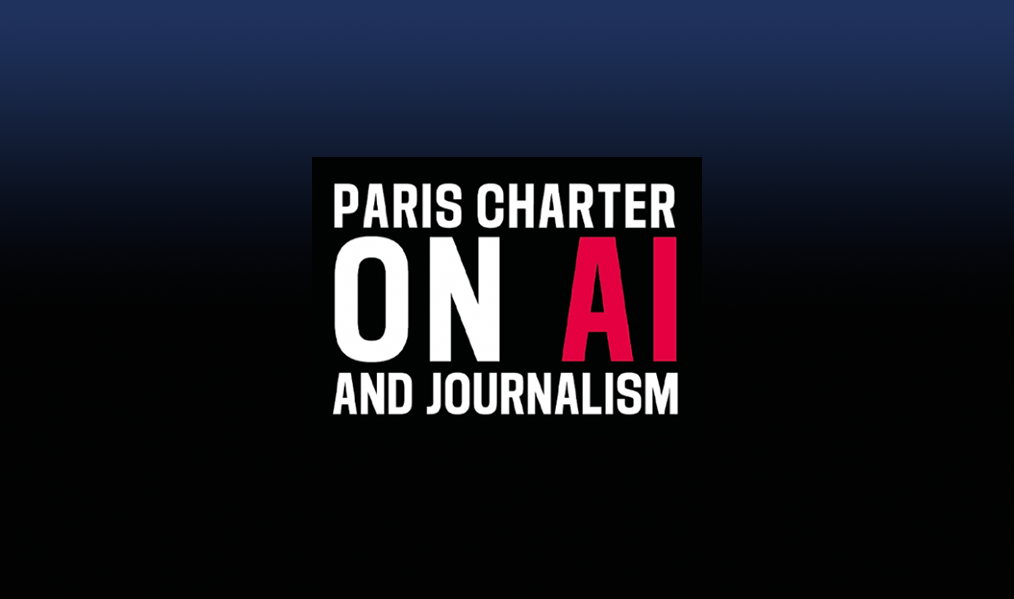
RSF and 16 partners unveil Paris Charter on AI and Journalism
On November 10th, 2023, Reporters Without Borders (RSF) and 16 partner organisations including the ABU published the Paris Charter on AI and Journalism, on the occasion of Paris Peace Forum. Work on the Paris Charter on AI and Journalism was launched in July 2023 in partnership with civil society organisations, experts in artificial intelligence, media representatives and journalists.
The charter was written by a commission that was brought together by RSF and was chaired by Maria Ressa, a journalist who was awarded the Nobel Peace Prize in 2021. The commission comprised 32 prominent persons from 20 different countries who are specialists in journalism or AI. The goal was clear – to determine a set of fundamental ethical principles to protect the integrity of news and information in the AI age, when these technologies are poised to transform the media industry.
Many organisations came together in an unprecedented manner to support the efforts of the commission and RSF. They included leading organisations that defend journalism and the media (Committee to Protect Journalists, Canadian Journalism Foundation, DW Akademie, European Journalism Centre, Ethical Journalism Network, Free Press Unlimited, Global Forum for Media Development, International Press Institute, Pulitzer Centre, Thomson Foundation), a federation of journalists (European Federation of Journalists), an organization that represents public service media (Asia-Pacific Broadcasting Union), an ICT research center (Collaboration on International ICT Policy in East and Southern Africa) and investigative journalism consortia (Global Investigative Journalism Network, International Consortium of Investigative Journalists and Organized Crime and Corruption Reporting Project).
In response to the turmoil that AI has created in the news and information arena, the Charter defines ten key principles for safeguarding the integrity of information and preserving journalism’s social role. Inter alia, the core principles state:
- Ethics must govern technological choices within the media;
- Human agency must remain central in editorial decisions;
- The media must help society to distinguish between authentic and synthetic content with confidence;
- The media must participate in global AI governance and defend the viability of journalism when negotiating with tech companies.
“AI exacerbates what is already an existential moment for journalism. While it promises new opportunities, it also brings significant threats to the integrity of information. Technological innovation doesn’t inherently lead to progress: it must be steered by ethics to truly benefit humanity. To safeguard the right to information, journalists and news organisations must join forces to ensure ethics guide the governance and use of the most transformative technology of our time. The Paris Charter on AI and Journalism is a significant step towards this goal.
Maria Ressa
Rappler founder and CEO, and Nobel Peace Prize laureate
“Artificial intelligence could provide remarkable services to humanity but it clearly has the potential to amplify the manipulation of minds to proportions unprecedented in history. The Paris Charter is the first international ethical benchmark for AI and journalism. Factual evidence, a clear distinction between authentic and synthetic content, editorial independence and human responsibility will be the primary guarantees for the right to reliable news and information in the AI era. More than ever, journalism requires a sound and widely recognised ethical foundation. Together with our partners, we call on reporters, editors and news organisations around the world to take ownership of these principles, to proclaim them, and to implement them in what they do.”
Christophe Deloire
RSF secretary-general
Technologies based on artificial intelligence offer unprecedented new perspectives but also pose unprecedented challenges for journalism.
At a time when deepfakes could amplify disinformation and shatter public trust in all audio-visual content, and when language models are liable to increase productivity at the expense of the integrity of news and information, media affirm by endorsing this Charter that they will not allow new technology to divert them from their mission of serving the public interest. The Charter promotes an approach in which human judgment and journalistic ethics constitute the pillars of journalism’s social function as a trusted third party.

